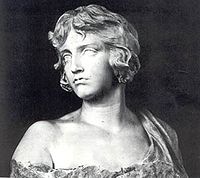
Nossis
Encyclopedia

Epigram
An epigram is a brief, interesting, usually memorable and sometimes surprising statement. Derived from the epigramma "inscription" from ἐπιγράφειν epigraphein "to write on inscribe", this literary device has been employed for over two millennia....
mist and poet
Poet
A poet is a person who writes poetry. A poet's work can be literal, meaning that his work is derived from a specific event, or metaphorical, meaning that his work can take on many meanings and forms. Poets have existed since antiquity, in nearly all languages, and have produced works that vary...
, c. 300 BCE, who lived in Locri
Locri
Locri is a town and comune in the province of Reggio Calabria, Calabria, southern Italy. The name derives from the ancient Greek town Locris.-History:...
. Her epigrams were inspired by Sappho
Sappho
Sappho was an Ancient Greek poet, born on the island of Lesbos. Later Greeks included her in the list of nine lyric poets. Her birth was sometime between 630 and 612 BC, and it is said that she died around 570 BC, but little is known for certain about her life...
.
Twelve epigrams of hers (one of which is perhaps spurious) survive in the Greek Anthology
Greek Anthology
The Greek Anthology is a collection of poems, mostly epigrams, that span the classical and Byzantine periods of Greek literature...
.
Meleager of Gadara
Meleager of Gadara
Meleager of Gadara was a poet and collector of epigrams. He wrote some satirical prose, now lost, and he wrote some sensual poetry, of which, 134 epigrams survive...
, in his Garland, includes her among the most distinguished Greek singers. Antipater of Thessalonica
Antipater of Thessalonica
Antipater of Thessalonica was the author of over a hundred epigrams in the Greek Anthology. He is the most copious and perhaps the most interesting of the Augustan epigrammatists...
ranks her among the nine poets who deserved the honor to compete with the Muse
Muse
The Muses in Greek mythology, poetry, and literature, are the goddesses who inspire the creation of literature and the arts. They were considered the source of the knowledge, related orally for centuries in the ancient culture, that was contained in poetic lyrics and myths...
s.
External links
Further reading
- Skinner, Marilyn B. "Aphrodite Garlanded: Erôs and Poetic Creativity in Sappho and Nossis". in Rabinowitz, Nancy Sorkin and Auranger, Lisa. Among Women: From the Homosocial to the Homoerotic in the Ancient World. University of Texas Press, Austin. 2002.

